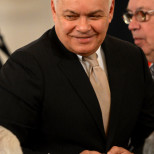Andrew Glass, politico.com, 02/17/16; via TL on Facebook
image from
On this day in 1947, the Voice of America, then an arm of the U.S. State Department, began beaming Russian-language broadcasts into the Soviet Union. The initial shortwave broadcast began with the words, “Hello! This is New York calling.”
Much of the first program offered brief summaries of current events, a discussion of how the U.S. federal budget and political system worked and an analysis of a “new synthetic chemical substance called pyribenzamine.” The music portion of the program featured an eclectic mix: The songs ranged from “Turkey in the Straw” to Cole Porter’s “Night and Day.”
Bad weather and technical difficulties degraded the program’s sound quality. Feedback from the U.S. Embassy in Moscow reported that Russians rated the program as only “fair.” In time, VOA broadcasts into the Soviet Union improved as music came to play an increasingly prominent role — while Cold War issues usually remained on the menu. On April 24, 1949, Soviet officials began to electronically jam VOA broadcasts.
In 1952, the Voice of America installed a studio and relay facility aboard a converted U.S. Coast Guard cutter renamed Courier whose target audiences were the Soviet Union and other members of the Warsaw Pact. The Courier was originally intended to become the first in a fleet of mobile, radio broadcasting ships that built upon U.S. Navy experience during World War II using warships as floating broadcasting stations. However, the Courier eventually dropped anchor off the island of Rhodes, Greece, with permission of the Greek government, to avoid being branded as a pirate radio ship. This VOA offshore station stayed on the air until the 1960s, when land facilities were provided to the broadcasters.
By the 1960s, VOA was broadcasting to every continent in several dozen languages. In 1994, the Voice of America became the first broadcast news organization to offer continuously updated programs on the Internet.
Today, VOA operates as an autonomous federal government agency. Its radio and television broadcasts are distributed by satellite, cable and on FM, AM and traditional shortwave radio frequencies. They are streamed on individual language service websites, social media sites and mobile platforms. The VOA also has affiliate and contract agreements with radio and television stations and cable networks worldwide.
***
Russia Ends VOA Radio Broadcasts, VOA
Posted April 11th, 2014
In one more example of escalating tensions between Washington and Moscow over Russia’s annexation of Crimea, Russia has cut off all programming by the Voice of America, a move which the Broadcasting Board of Governors, the organization that oversees VOA, has strongly condemned.
The decision was delivered in a curt, one-sentence letter from Dmitry Kiselyov, who heads theRossiya Segodnya (Russia Today) Information Agency, responding from the BBG’s request to renew its long-standing contract to broadcast in Russia.

Dmitry Kiselyov, the head of media conglomerate Rossiya Segodnya (Russia Today) smiles as he attends a joint session of Russian parliament on Crimea’s incorporation into Russia at the Kremlin in Moscow on March 18, 2014. AFP PHOTO / KIRILL KUDRYAVTSEV
“We are not going to cooperate,” the letter read.
This means that the last VOA programming, which includes news and English-language lessons–has stopped airing on local Moscow frequency 810 AM.
“Moscow has chosen to do the wrong thing and restrict free speech,” said BBG Chairman Jeff Shell. “This is a fundamental value shared by many countries around the world.”
Shell pointed out that Russian programming, including Russia Todaytelevision, continues to air in the United States.
“We urge Mr. Kiselev and other Russian authorities to open Russian airwaves to more of our programs and those of other international broadcasters,” Shell added. “We’re asking for an even playing field.”
According to RT, Kiselyov says his decision doesn’t have “anything to do with the freedom of speech” but that neither the VOA nor Radio Svoboda (Radio Free Europe/Radio Liberty’s Ukrainian service) “have nothing original to say.”
“They sound like they are broadcasting from another world, at least from a world that doesn’t exist anymore” Kiselyov said. “I regard these radio stations as mere spam on our frequencies.”
Kiselyov’s letter to the BBG was dated March 21–which, coincidentally, was the same day that theEU froze his assets and banned his travel. The EU called him a “central figure of the government propaganda supporting the deployment of Russian forces in Ukraine,” according to a list published today in Brussels.
This is the same gentleman who, on his recent television show, boasted that Russia has the capability to turn the US into “radioactive ashes.”
Russia’s decision does not mean that Russians won’t have access to the VOA. We are still available on our website, Facebook and Twitter, as well as via satellite.

No comments:
Post a Comment